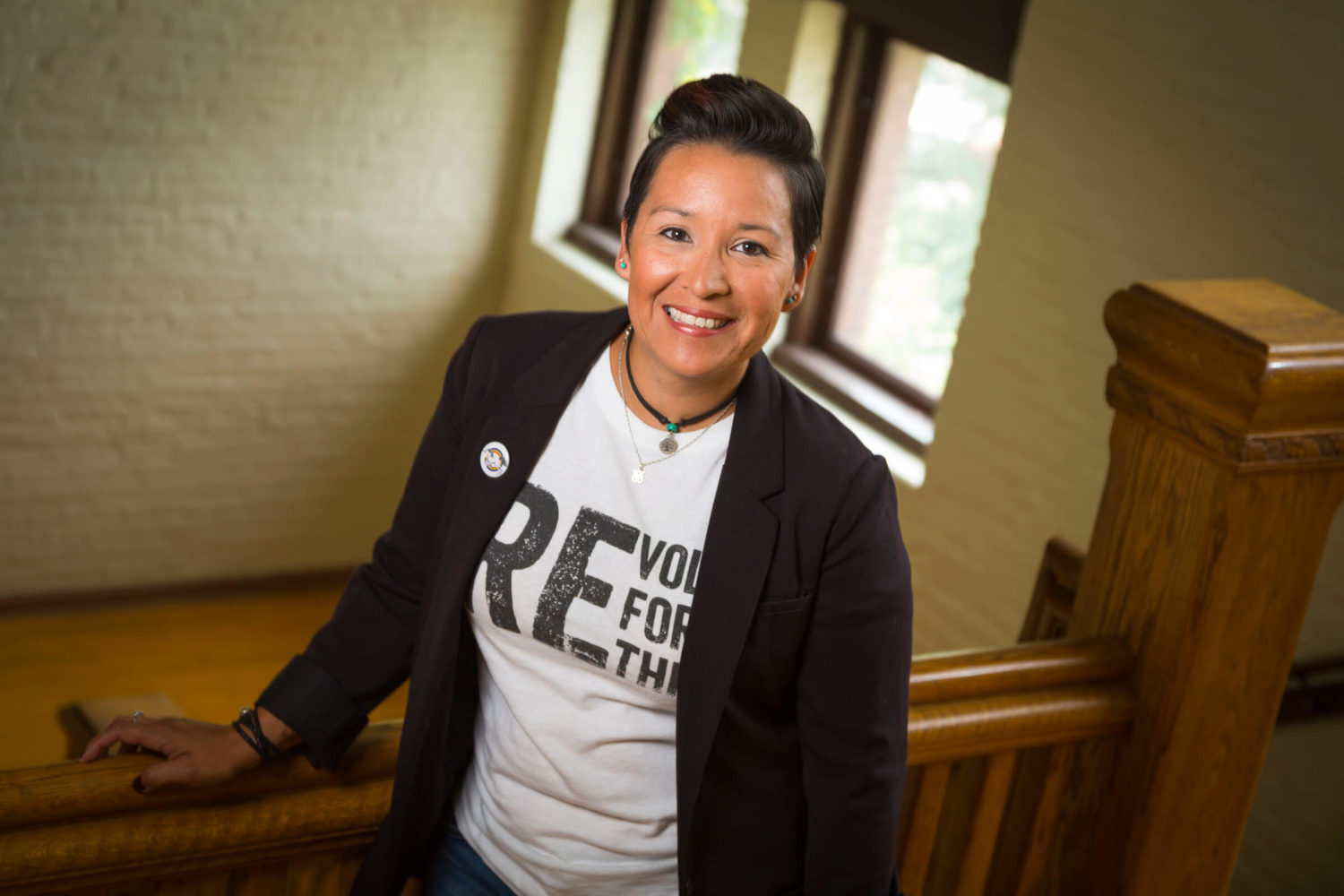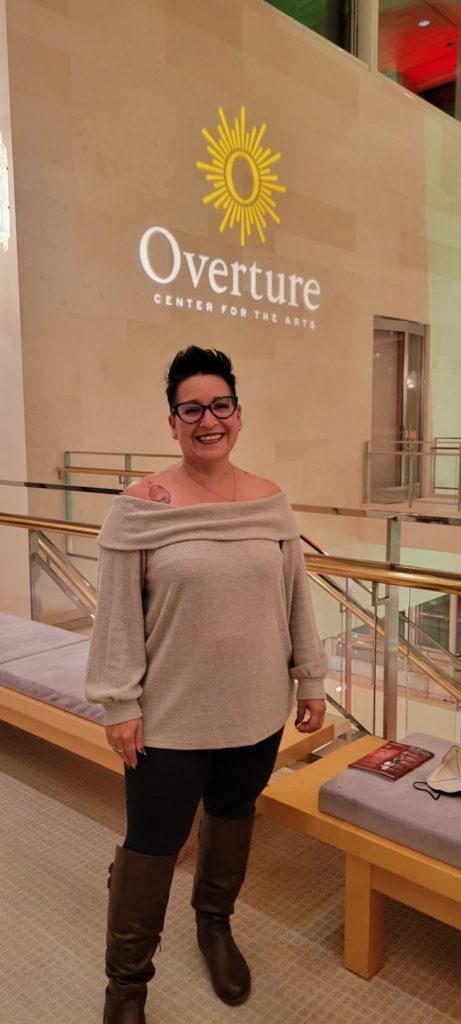
Ida Balderrama-Trudell, Overture Center’s new Director of Equity and Innovation, is all about connections.
“I think if you asked people, ‘what would you say about Ida?’ They would say, ‘She’s a connector. She’s a learner and she’s a connector.’ I’m excited about building bridges and connections,” she told Madison365 in an interview Thursday.
She’ll begin building those connections on January 18 after more than 20 years in a number of roles at the University of Wisconsin, most recently as director of student engagement in the School of Education’s Office of Diversity, Equity and Inclusion.
She’s been a regular at Overture, though, ever since her daughters – now 19 and 15 – attended performances on field trips with their classmates at St. James School.
“I was always one of the first parents to sign up for those Overture trips because I loved taking the kids up to those trips to see those shows,” she said.
But she was also aware that the gleaming downtown arts center could feel a little off-putting at times.

“I still think that, from my perspective, Overture Center can seem inaccessible,” she said. “I think that some of the school programs bring in a very diverse student body, but I don’t know that that translates to students’ families or guardians, people that they go back home to, and we want that. I mean, I won’t lie, when I go and take my family to Overture, my kids are biracial, but we’re three people of color in a sea of mostly white folks.”
But she’s seen a shift since longtime Madison educator Dr. Ed Holmes joined Overture’s executive team as Chief Innovation and Equity Officer.
“I noticed one time we were at a performance and I was like, ‘Did they just do a land acknowledgment? Oh my gosh, that is amazing. That is great,’” she said. “Started seeing more diverse performances, performers, conversations. And I was like, ‘What is happening over there?’ I had been following it, and been very happy that that was happening.”
Now she’ll be working for Holmes to help the performing arts center, which grew out of the Madison Civic Center thanks to a $205 million donation from Jerry Frautschi, take the next steps in engaging a more diverse audience and arts community.
“They can’t ever take that education away from you”
Balderrama-Trudell comes from one of the many Mexican-American families who never really immigrated to the US.
“The border crossed us … when we were in Northern Mexico,” which is now Texas, she said. She was born in California, and the oil and gas industry drew her family back to West Texas when she was just 6 years old, and she grew up in the world of Friday Night Lights: “Football and marching band,” she recalled.
Even though they didn’t have college degrees, her parents put a strong emphasis on education for Balderrama-Trudell and her sister.
“Education was always really, really important in our family. It was never a matter of if my sister and I were going to go to college. It was always when,” she said. “My parents don’t have college degrees but they knew it was important for us to go to school. As a matter of fact, my dad was pretty adamant that getting an education was one of the ways we could combat the racism that we had experienced for many generations in our family. Being a Mexican-American family, my dad was like, ‘They could do a lot of things to you, but if you go to school, they can’t ever take that education away from you.’”
While earning a degree with a double major in psychology and human development and family studies from Texas Tech, she knew she wanted to continue her education but wasn’t sure how. A professor – her first Latina professor, incidentally – connected her with a recent graduate from UW-Madison’s graduate program in human development. Balderrama-Trudell and her sister, a senior in high school at the time, visited Madison, and that was that.
“It was the only graduate program I applied to. It was the only college that my sister and applied to. And we both got in,” she said.
Balderrama-Trudell’s sister attended through what was the Powers-Knapp Scholarship program, founded and headed at the time by Mercile Lee. But after two years in her own graduate program, Balderrama-Trudell was out of funding.
“It was stressing me out. My sister was stressed out on my behalf,” she recalled. “And she talked to Mercile, and Mercile was like, ‘Have your sister come in and talk to me.’”
Lee brought her on as a student adviser, which ended up being her first real foray into DEI work.
“That’s really when I started finding a passion for supporting other students who had experiences like me. First-generation students, low income, students of color, and really helping them so they didn’t have to struggle the way I had struggled,” she said.
Over the next 20 years or so, she would go on to serve assistant director and academic adviser of the Posse Scholars program (“They used to joke with me that I was the Posse mom”), special assistant and later chief of staff for former Dean of Students Lori Berquam, special assistant to former Dean of Students Lori Berquam, chief of staff to interim dean Argyle Wade, inaugural interim director of the Office of Inclusion Education and interim director of the Multicultural Student Center.
Along the way she earned a master’s degree and this May will finish her EdD from the UW-LaCrosse.
Working in the Posse Program in particular “changed my life,” she said. “It changed the way that I view this work.” She worked in proximity to scholars of other diversity-focused programs like PEOPLE and First Wave.
“I think you can’t be around Posse scholars, First Wave scholars, PEOPLE scholars on campus and not want to be in that fight for them for social justice,” she said.
After more than two decades, next week she starts her first job outside of academia.
“I’m not worried about it. I’m definitely excited about it. It’s a shift, for sure. All I have known for my entire life has been education,” she said. “This is still education. It’s just in a different way. I’m really excited about it. I think it’ll be a different challenge.”
The story of who we are now
Balderrama-Trudell said growing up around the arts has also helped prepare her for this new job.
“We didn’t have a lot of money, but when my parents could, they would save money, we’d take trips to San Antonio,” she said. “I’d go to a show or we’d go to different things every now and then. We didn’t go often, but they definitely thought it was important to show us those things. And being somebody who was musical from fifth grade until I graduated from high school and being in a marching band and kind of learning about arts and leadership and those kinds of things was important.”
She also knows very well Overture still has a reputation as somewhat inaccessible – but also believes a lot of people just don’t know enough about the center.
“I think subsets of the community understand Overture. And I think that Overture is definitely connected to the community. And I think we can do more,” she said. “I mean, I’m a developmentalist. I truly believe that we can always learn more and lean into that a little bit more. … I don’t know if it’s my job to change the reputation so much as to continue to tell the story of who we are now to different subsets of the population who might not have heard the story at all.”
And however she’s able to do that, she’ll lean on creating community connections to get it done.
“My hope is that the Overture Center for the Arts kind of becomes the go-to for (community connections),” she said. “I really would like to see the connection, the bridge building. I would like for Overture to be one of the first places that people think of when they think about, ‘how are we contributing to the arts in Madison and social justice?’”
And, in her mind, arts and social justice go hand-in-hand.
“There’s something about it being arts that … allows people to lean into (social justice) in a different way and make it a little bit more accessible to people,” she said. “And I’m excited about that because I think that it’s a really great opportunity. So yeah, I’m a little nervous, but I’m also really, really excited.”
This story has been corrected to accurately reflect Balderrama-Trudell’s job titles.



